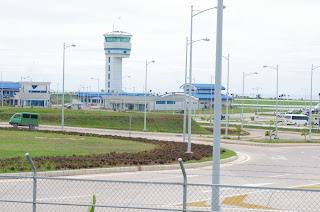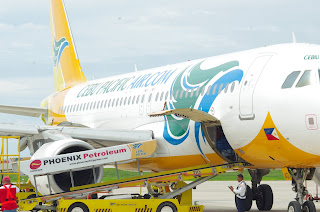The largest and the first ever in Northern Mindanao, the Laguindingan
International Airport has officially opened on June 15, 2013. The event is a
milestone in the history of Northern Mindanao and the cities of Cagayan de Oro and
Iligan. Personnel of the old Lumbia airport move its equipment and facilities to
the new airport which will serve the airline passengers of the region. Lumbia
airport is turned over to the Philippine Air Force which will use it for its
flight operations.
A flagship project of the Cagayan de Oro-Iligan Corridor Development
Project (CIC), the new airport was conceptualized in 1991 during the term of
the late President Corazon C. Aquino. The CIC was envisioned to develop a
growth area in Northern Mindanao with the cities of Cagayan de Oro and Iligan
as hubs of economic activities. The plan for the airport was started during the
term of President Fidel V. Ramos. On January 10, 2006, President Gloria
Macapagal Arroyo led the ground breaking ceremony for the start of its construction.
The newly finished airport sits in 4.17 square kilometers of
land at Barangay Moog, Laguindingan, Misamis Oriental. It has a 2.1-kilometer
long and 45-meter wide runway. A 4.4-kilometer, four-lane access road connects
the new airport to the Laguindingan national highway. It is 46 kilometers from
Cagayan de Oro and 61.9 kilometers from Iligan. The airport is equipped with
the most modern facilities. However, for the meantime, the airport will operate
under the Visual Flight Rule (VFR) because the Instrument Landing System (ILS)
which will enable the pilots to land plane at night and in poor visibility is
yet to be installed.
The construction was undertaken by Yooshin Engineering of
Korea, Schema Konsult Inc. of Ortigas Center, Pasig and Hanjin Heavy Industries
and Construction Company, the general contractor of the project. Cost of the
airport which was funded by the Philippine government and foreign loans was
167.09 million US dollars or 7.853 billion Philippine pesos.
On April 18, 2013, the Department of Communications and
Transportation (DOTC) announced that the opening would be postponed to June 15
instead of April 30, 2013 because the Civil Aviation Authority of the
Philippines (CAAP) received request from airline companies to postpone the
transfer after the summer peak season because the April 30 opening would
require cancellation of several booked flight tickets.
Business groups from Cagayan de Oro such as the Cagayan de
Oro Chamber of Commerce Foundation Incorporated voiced their concern and
opposition to the “premature” opening of the airport citing safety reasons
since the new airport has yet to install the ILS which means that the airport
could operate only during day time. They also added that the lack of night flights
could mean losses in billions of pesos. But aviation authorities said that the
problem can be dealt with by increasing the number of flights during the day.
And that the airport can operate safely without the ILS. The Mactan
International Airport in Cebu operated without ILS for 3 years.
CAAP Director General William Hotchkiss and Secretary of
DOTC Joseph Emilio Abaya assured the public that the airport is safe for the
aircraft and passengers. They added that the Laguindingan Airport is safer
than Lumbia Airport because of the ideal
ground elevation of the former. They said that Lumbia is difficult to land
during extreme weather because it is on a mountainous ground with an elevation
of 183 meters or 601 feet while Laguindingan is situated at a coastal area with
an elevation of only 190 feet above sea level which makes it easier for a pilot
to land a plane even in an unfavorable weather condition.
President Benigno Aquino III inspected and inaugurated the
airport on June 11, 2013. He was met by notable personalities such as Governor
Oscar Moreno, the newly elected mayor of Cagayan de Oro City, Archbishop
Antonio Ledesma and Manila-based business Tycoon Jaime Zobel de Ayala. With the
president were DILG Secretary Manuel Roxas III, DOTC secretary Jose Abaya and
other presidential staff. The landing of the presidential plane at the
airport’s runway is a tacit assurance from the president himself that the
airport is indeed safe for airline passengers.
Remaining navigational aid equipment is expected to be installed
within this year and that by early 2014 the airport will be capable of
accommodating bigger planes for international flights such as an airbus with a
seating capacity of 300 passengers. The volume of traffic in 2012 in Lumbia
airport is about 1.4 million of passengers. The new airport at Laguindingan has
a terminal that can accommodate 1.6 million of passengers annually. Another
terminal will be constructed to accommodate the influx of more passengers in
the future. The Laguindingan International Airport will surely boost tourism
and economic activities of Northern Mindanao with the city of Cagayan de Oro
having the lion’s share of the economic windfall that comes with the opening of
the new international standard airport.









